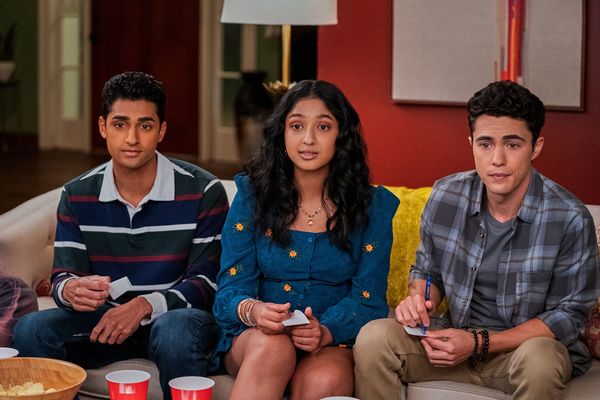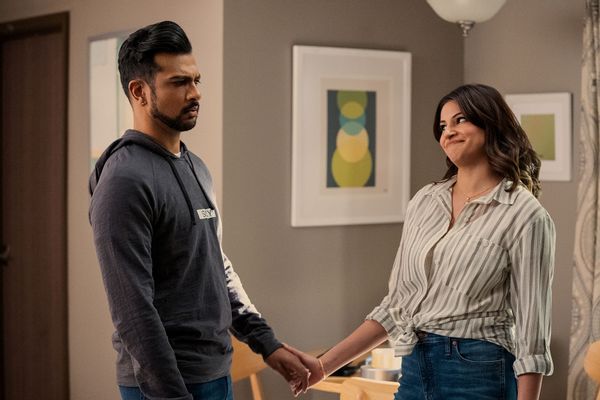“Never Have I Ever” highlights the rarity of South Asian couples on TV. Then it breaks up with one
“Never Have I Ever” has primed us from the start to cheer for Devi Vishwakumar (Maitreyi Ramakrishnan) and all her wild ambitions. Our girl set out to boost her popularity and voila: in junior year, she’s no longer the nerd.
She aimed high – and off target, at first – and finally landed the hottest guy in school, Paxton Hall-Yoshida (Darren Barnet). Within the space of the third season, they go from the school’s most talked-about couple to exes and back to friends again. But Devi is in her stride, and her rebound is the even hotter Nirdesh, aka Des (Anirudh Pisharody). He’s her match in intellect and wit, is at the top of his class at a local private school, and happens to be the son of her mother’s new friend.
From the perspective of her mother Nalini (Poorna Jagannathan) and her traditional-minded grandmother (Ranjita Chakravarty), the Des-Devi match is appropriate. From the view of a horny 16-year-old girl healing from grief and starting to truly love herself, Des is a spotless candidate to share her first sexual experience.
But when the time comes, it isn’t with Des. It’s with the person series co-creators Mindy Kaling and Lang Fisher have been easing into her affections, romantic and platonic, from the start. And while that season-ending scene showing Devi cashing in her V-card with her chosen boy is amply earned, it comes at a cost.
Much as we love the guy in question, maneuvering Devi into his arms means blowing a chance to expansively explore what it’s like for a girl like Devi and a boy like Des to date under the watchful eyes of parents like Nalini and Des’ natural health-obsessed mother Rhyah (Sarayu Blue). For the short time Des and Devi were together, they represented one of a very few teenage couples in a scripted TV show where both parties are South Asian.
Until romance with non-white couples is more frequently represented in A-plots like Devi’s, the way those affairs begin and end invites a deeper level of scrutiny.
By itself that distinction isn’t enough of a reason for the “Never Have I Ever” writers to keep Des and Devi together, but it adds to the sting of their break-up, mainly due to the weeny nature of how it went down.
If there were more couples like Des and Devi on TV, that wouldn’t matter. Kaling and a few other producers are working on that, no question. But that also means that until romance with non-white couples is more frequently represented in A-plots like Devi’s, the way those affairs begin and end invites a deeper level of scrutiny than the types of duos we’re accustomed to seeing on TV.
Kaling has previously withstood critiques concerning the tendency for her non-white leads to end up with white men, which should not matter. Except for the fact it does in an industry that has a habit of casting people of color with white partners – usually non-white women with white guys – and putting it forth as a simplified vision of multiracial pluralism.
 Anirudh Pisharody as Nirdesh, Maitreyi Ramakrishnan as Devi and Darren Barnet as Paxton Hall-Yoshida in “Never Have I Ever” (Lara Solanki/Netflix)
Anirudh Pisharody as Nirdesh, Maitreyi Ramakrishnan as Devi and Darren Barnet as Paxton Hall-Yoshida in “Never Have I Ever” (Lara Solanki/Netflix)
This is one of the reasons Devi pictures Des as a dweeb before they meet in person. Rhyah sets them up, in a matter of speaking, by pushing Nalini to ask Devi to take Des to a party. Devi expects a gawky loser in a sweater vest to stumble into the place.
“I’m so sorry. I did not mean to offend you!” Devi says after Des realizes she’s hedged her bets by telling her friends he’s her cousin. “But let’s be honest, there’s a lot of nerdy Indian guys! And, I know you know this, but your name does have the word ‘nerd’ in it.”
“I’ve met a million of you before,” Des tells Devi. “You’re one of those Indian girls who only likes white guys. Who thinks all Indian dudes are just computer geeks or cheesy club rats who wear too much cologne.”
“No, that’s not what I’m like!” Devi insists. “That’s exactly what she’s like!” Devi’s inner narrator John McEnroe interjects. Several episodes later, the writers close the season by proving the truth of the tennis legend’s snark. Somewhat.
“Never Have I Ever” is still one of the funniest and most thoughtful multi-generational portraits of what it means for women to figure out who they are and what they want. Placing that focus on women who are direct immigrants or first-generation immigrants makes it special, distinguishing Devi’s journey along with Nalini’s gentle acclimation to being single again after losing the love of her life, Devi’s father Mohan (Sendhil Ramamurthy).
Until the start of this season, the flashback scenes of Nalini and Mohan’s early romance were pretty much the only depiction on the show of two of its main Indian characters in love – and Mohan is dead. Nalini entertained the thought of dating again, courtesy of a fellow dermatologist played by Common. She eventually concludes that neither she nor Devi is ready for Nalini to begin dating again.
Even that is another means of teasing out the ways that life for the Vishwakumar women is transforming as they realize that they can maintain a sense of cultural tradition while making the most of America’s emphasis on making one’s way through the world, guided by desire as opposed to concerns about community standing.
“Never Have I Ever” is still one of the funniest and most thoughtful multi-generational portraits of what it means for women to figure out who they are and what they want.
Kamala (Richa Moorjani), who called off her arranged engagement to a magazine-perfect man, plays out this ideal in Season 3 by insisting on dating Utkarsh Ambudkar’s Manish, Devi’s English teacher, instead of settling for one of grandma Nirmala’s “suitable” choices – traditional Indian men well versed in their culture’s customs.
Manish is American to the bone, which Nirmala doesn’t trust at first until he wins her over with a solid act of kindness. The show has reserved the most thoughtfulness and complexity for its examination of how Nalini’s and Kamala’s choices clash with cultural expectations before eventually, gently melding the two into a way of being that makes everybody happy.
 Utkarsh Ambudkar as Manish Kulkarni and Richa Moorjani as Kamala in “Never Have I Ever” (Lara Solanki/Netflix)
Utkarsh Ambudkar as Manish Kulkarni and Richa Moorjani as Kamala in “Never Have I Ever” (Lara Solanki/Netflix)
As this pertains to Devi’s friends, crushes, and boyfriends, the writers take care to bring her white friends into her family’s world to share meals and celebrations more often than the other way around.
There’s still a part of me that wishes the show had spent more time investigating what it meant for Devi and Des to share a cultural shorthand that she didn’t have with her other boyfriends, if only to weigh in on how much that actually matters. Season 2 of another vastly underrated Netflix comedy, “Love Life,” explores this thoughtfully and thoroughly through one couple that doesn’t make it either.
Again, that show features adults treading water in the dating pool. Teen love is another situation where such notions aren’t informed by life experience; these are still kids fumbling through the distinctions between lust and the real thing. That still doesn’t make the hasty interruption to Des and Devi go down easier.
Want a daily wrap-up of all the news and commentary Salon has to offer? Subscribe to our morning newsletter, Crash Course.
Everything is going well until Devi is set to perform at a school recital for the first time since Mohan’s death and thinks she sees him in the audience, unleashing a flash grief tsunami that takes her legs out from under her again. Rhyah finds Devi crumpled in a panic attack in the bathroom and talks her through it, saying all the right things to restore her calm and get her onstage. However, instead of this mother viewing the girl’s completely normal grief response with compassion, she takes Des aside and tells him that Devi is unbalanced, ordering her son to break up with her.
Des responds by canceling dates they’d set before out-and-out lying to Devi about being out of town. She tracks him down at a local café and throws an iced drink in his face, seeming to confirm Rhyah’s uncharitable estimate of her. But when Devi points out to Des that he can decide for himself whether he wants to date her, Des weakly points out that his mother pays for his cell phone.
Thus ends our time with Devi’s only brown boyfriend or crush since the series began – but maybe not the last one. The third season also ends with Paxton graduating and on his way to Arizona for college, making room for fresh options.
Of course, there’s still the matter of the guy whose bedroom she heads into, closing the door behind her; they’ve agreed to share a pivotal moment, but they’re not with each other. The fourth and final season of “Never Have I Ever” may put them together in the end, and it has done a wonderful job of building that case. I only wish they’d let us down more gently in breaking up Des and Devi.
“Never Have I Ever” is currently streaming on Netflix.
Read more
about romance on TV

